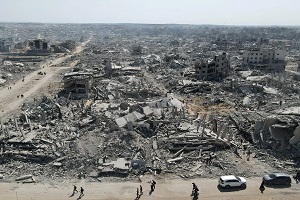70% of Jordanians confident in Hassan’s Cabinet — CSS poll
The Jordan Times
AMMAN — A new opinion poll, conducted by the Centre for Strategic Studies (CSS) at the University of Jordan, has revealed a notable increase in public confidence in Prime Minister Jafar Hassan’s Cabinet, one year after its formation.
According to the findings, 70 per cent of Jordanians, including both the general public and opinion leaders, said they trust the current government, with 23 per cent expressing strong confidence and 47 per cent reporting moderate confidence.
The findings also show a rise in engagement with government affairs, with 85 per cent of opinion leaders and 49 per cent of the general public said they follow the government's actions.
Confidence in the government's ability to fulfil its responsibilities has reached 61 per cent, up from 54 per cent in the initial formation poll and 51 per cent in the 100-day poll and 65 per cent at the 200-day mark.
Confidence in Prime Minister Jafar Hassan has also increased, with 67 per cent of the national sample believing he has successfully met the demands of his role during the first year of his government, compared to 57 per cent at the time of formation and 55 per cent after 100 days.
Excluding the prime minister, confidence in the ministerial team also went up, with 58 per cent considering it capable of performing its duties, up from 50 per cent in the formation poll and 47 per cent after 100 days in office.
Optimism about the country’s direction is also on the rise.
Fifty-seven per cent of Jordanians believe the country is moving in the right direction, compared to 47 per cent in the 100-day survey and 55 per cent at the government formation [in September 2024].
At the same time, the proportion of those who believe the country is heading in the wrong direction dropped to 35 per cent, down from 51 per cent and 40 per cent in earlier polls.
The prime minister’s field visits to various regions across the country have been positively received, with 65 per cent of the general public and 64 per cent of opinion leaders expressing satisfaction. The poll said that 43 per cent believe these visits have had a positive impact on governorates.
On service delivery, 73 per cent of the national sample and 60 per cent of opinion leaders believe the government is doing all it can to provide services to citizens.
The poll also assessed public sentiment regarding the government’s comprehensive modernisation project, including its economic, political, and administrative components.
Forty-four per cent of citizens and 56 per cent of opinion leaders are optimistic about the government’s ability to implement the economic modernisation vision, while 46 per cent and 61 per cent, respectively, expressed optimism about public sector reform.
Confidence in the continuation and strengthening of political reform stood at 48 per cent among the public and 60 per cent among opinion leaders.
Economic outlook
The percentage of Jordanians who believe their economic situation will get better in the coming year rose to 48 per cent, a 12-point increase from the 100-day poll. In contrast, 20 per cent expect their situation to worsen, and 28 per cent believe it will remain the same.
On local governance, 55 per cent of the national sample and 50 per cent of opinion leaders support a proposal to appoint mayors instead of electing them, while 38 per cent and 48 per cent, respectively, are opposed.
Support for maintaining governorate councils (decentralisation) stands at 51 per centamong citizens and 50 per cent among opinion leaders. Meanwhile, 43 per cent of the national sample said they intend to participate in the next municipal and governorate elections.
Recent government decisions have been met with strong approval, with 95 per cent of Jordanians support the reinstatement of compulsory military service, believing it will help instil national loyalty and a culture of discipline.
The latest Cabinet reshuffle was supported by 56 per cent of the national sample and 37 per cent of opinion leaders. Regionally, 52 per cent of the general public and 61 per cent of opinion leaders are optimistic about the government’s ability to manage regional affairs.
The government’s handling of the war in Gaza has received overwhelming approval, with 87 per cent of Jordanians expressing satisfaction with the state’s position.
According to the poll, 71 per cent believe the war has strengthened relations between Jordan and Palestine.
Nearly 90 per cent of respondents rated Jordan’s relationship with Syria as good or very good.
Latest News
-
 Hamas demands seven Palestinian leaders in exchange deal
Hamas demands seven Palestinian leaders in exchange deal
-
 Palestinians return to devastated Gaza City as truce holds
Palestinians return to devastated Gaza City as truce holds
-
 Venezuela's Machado wins Nobel Peace Prize - and dedicates it to Trump
Venezuela's Machado wins Nobel Peace Prize - and dedicates it to Trump
-
 Trump announces new 100 percent China tariff
Trump announces new 100 percent China tariff
-
 US troops arriving in ‘Israel’ to oversee Gaza ceasefire: US media
US troops arriving in ‘Israel’ to oversee Gaza ceasefire: US media